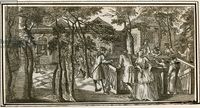Annotation:Islington Wells: Difference between revisions
No edit summary |
m Text replacement - "garamond, serif" to "sans-serif" |
||
| Line 1: | Line 1: | ||
=='''Back to [[{{BASEPAGENAME}}]]'''== | =='''Back to [[{{BASEPAGENAME}}]]'''== | ||
---- | ---- | ||
<p><font face=" | <p><font face="sans-serif" size="4"> | ||
'''ISLINGTON WELLS.''' English, Country Dance Tune (6/4 time). G Major. Standard tuning (fiddle). AABB. The melody appears in all four editions of '''The Second Volume of the Dancing Master''' [http://www.izaak.unh.edu/nhltmd/indexes/dancingmaster/Dance/Play5616.htm] (1718-1728), published in London by John Young, heir to the Playford publishing concerns. It also was printed by Walsh and Randall in their '''The New Country Dancing Master, Second Book''' (London, 1710) and in Walsh and Hare's '''The Second Book of the Compleat Country Dancing-Master''' (London, 1719). | '''ISLINGTON WELLS.''' English, Country Dance Tune (6/4 time). G Major. Standard tuning (fiddle). AABB. The melody appears in all four editions of '''The Second Volume of the Dancing Master''' [http://www.izaak.unh.edu/nhltmd/indexes/dancingmaster/Dance/Play5616.htm] (1718-1728), published in London by John Young, heir to the Playford publishing concerns. It also was printed by Walsh and Randall in their '''The New Country Dancing Master, Second Book''' (London, 1710) and in Walsh and Hare's '''The Second Book of the Compleat Country Dancing-Master''' (London, 1719). | ||
[[File:newtunbridgewells.jpg|200px|thumb|left|New Tunbridge Wells in 1735]] | [[File:newtunbridgewells.jpg|200px|thumb|left|New Tunbridge Wells in 1735]] | ||
| Line 33: | Line 33: | ||
</blockquote> | </blockquote> | ||
</font></p> | </font></p> | ||
<p><font face=" | <p><font face="sans-serif" size="4"> | ||
''Source for notated version'': | ''Source for notated version'': | ||
<br> | <br> | ||
<br> | <br> | ||
</font></p> | </font></p> | ||
<p><font face=" | <p><font face="sans-serif" size="4"> | ||
''Printed sources'': | ''Printed sources'': | ||
<br> | <br> | ||
<br> | <br> | ||
</font></p> | </font></p> | ||
<p><font face=" | <p><font face="sans-serif" size="4"> | ||
''Recorded sources'': <font color=teal></font> | ''Recorded sources'': <font color=teal></font> | ||
</font></p> | </font></p> | ||
Latest revision as of 13:27, 6 May 2019
Back to Islington Wells
ISLINGTON WELLS. English, Country Dance Tune (6/4 time). G Major. Standard tuning (fiddle). AABB. The melody appears in all four editions of The Second Volume of the Dancing Master [1] (1718-1728), published in London by John Young, heir to the Playford publishing concerns. It also was printed by Walsh and Randall in their The New Country Dancing Master, Second Book (London, 1710) and in Walsh and Hare's The Second Book of the Compleat Country Dancing-Master (London, 1719).

The mineral wells at Islington were also called New Tunbridge Wells. They were described by Halliwell in 1863 in his small book An Old Poem on The Mineral Wells at Islington near London, Describing the Company who Resorted to Them:
These springs were discovered by a person of the name of Sadler in 1683, and the spot is still known as Sadler's Wells [2], a theatre now occupying the site. According to Cunningham, a pamphlet was published in 1684, giving an account of the discovery, with the virtues of the water, which is there said to be of a ferrugineous nature, and much resembling in quality and effects the water of Tunbridge Wells.
A poem called "Islington Wells, or the Three-penny Academy" was penned in 1691 and printed for E. Richardson. It begins:
Fev'rish and hot by drinking claret,
(And where's the mortal who can forbear it)
All pillow consultations scorning,
I left my bed by six i'th' morning;
About which time dull sots are snoring
And sparks just rose from private whoring;
But being drest, I found the curse,
Of a hot head, and cooling purse,
My guineas spent, my angels flown,
And nothing but a clipt half-crown,
(Which twinkling lay like snuff in socket)
To keep the Devil from my pocket:
Then think how could a scene of pleasure,
Be purchas'd with so small a treasure?
etc.
Source for notated version:
Printed sources:
Recorded sources:
